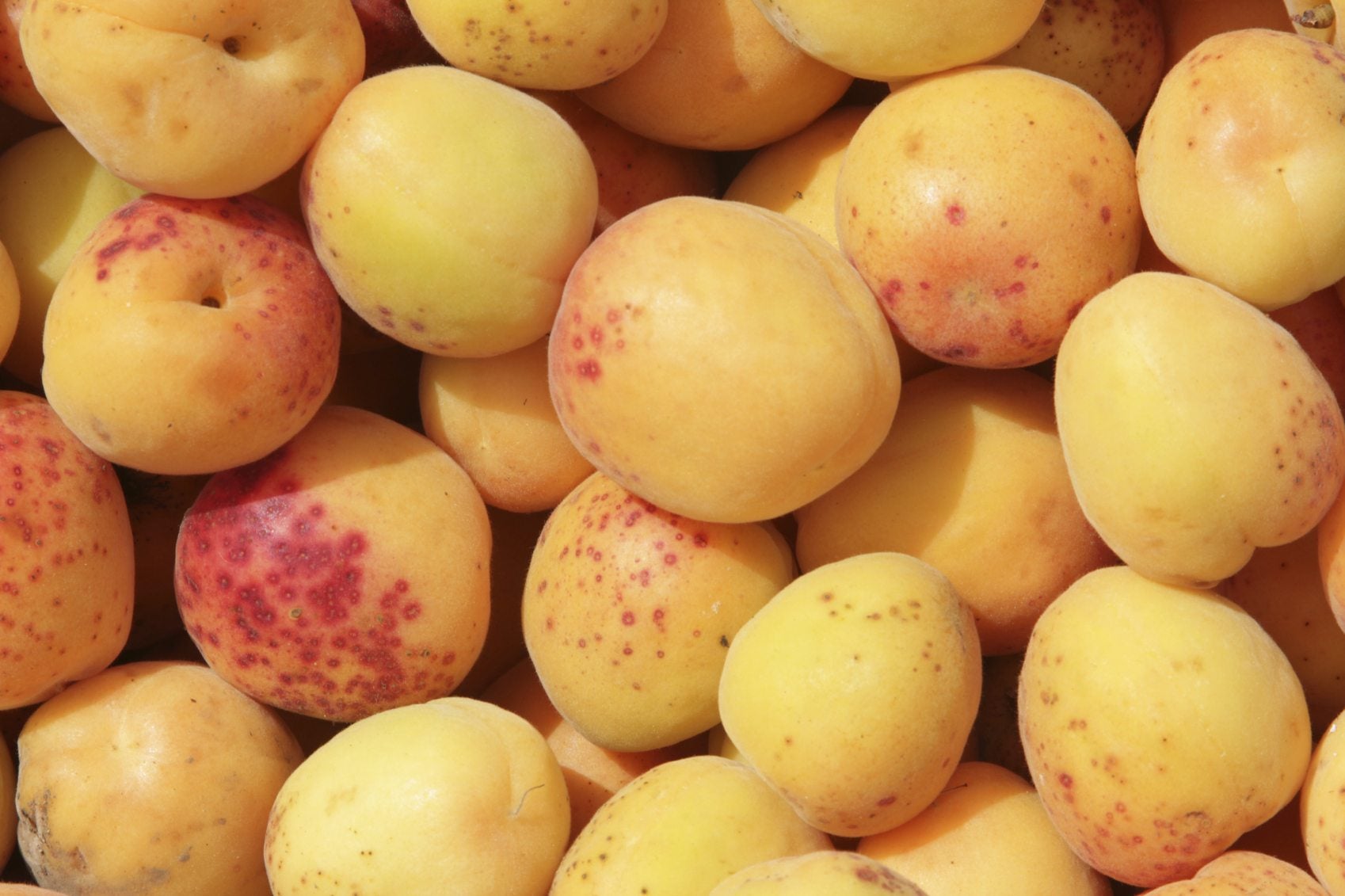Learn About Aprium Trees: Information On Aprium Tree Care

I would venture to guess that we all know what a plum is, and we all know what an apricot is. So what is aprium fruit? Aprium trees are a cross or hybrid between the two. What other aprium tree info may be useful in its cultivation? Learn more in this article.
What is Aprium Fruit?
As mentioned, aprium fruit is a hybrid between a plum and an apricot, except additional aprium tree info enlightens us that it's a little more complicated than that. Botanists call such hybrids an “interspecific.” Both apriums and better known pluots are interspecific. They are complex genetic crosses wherein dozens of generations of crossing plum and apricots with other plum-apricot hybrids results in a fruit with premium flavor and texture. The resulting aprium is not as simple as cross breeding one single apricot with one single plum.
Additional Information about Aprium Trees
No one knows exactly what percentage of apricot and plum are in an aprium. However, it is known that a pluot is more of a plum with a smooth skin akin to a plum, while an aprium is more apricot than plum with an exterior reminiscent of a fuzzy apricot. To confuse things even more, the fruit from the growing aprium tree (and the pluot) is of multiple varieties, each with its own unique color, shape and ripening time. Generally, an aprium has a bright orange skin with some “fuzz” and an orange interior surrounding a stone or pit similar to an apricot. They are about the size of a large plum and known for their sweet flavor. They are available from late spring to late summer and can often be found at the local farmers market. As pluots and apriums are fairly new fruits, further investigation about aprium trees informs us that the hybridized “new-fangled” fruits are indirectly the result of research pioneered by the father of scientific plant breeding, Luther Burbank. He created the plumcot, half plum and half apricot, that a farmer/geneticist by the name of Floyd Zaiger used to engineer the aprium as well as over 100 other fruit varieties; all, by the way, through hand pollination, not genetic modification.
Aprium Tree Care
Although apriums have a look akin to an apricot on the outside, the flavor is more plum-like with a firm, juicy flesh. Introduced in 1989 with the cultivar ‘Honey Rich,' this is a unique specimen to grow in the home orchard. Keep in mind that this is a deciduous tree that grows up to 18 feet in height and requires either another aprium or an apricot tree for pollination. What other aprium tree care is useful when growing aprium trees? When growing aprium trees, they require a climate with warm springs and summers for harvest, but they also need 600 chilling hours with temps below 45 degrees F. (7 C). These chilling temps are necessary for the tree to become dormant. Because they are a rarity among fruit trees, they will probably need to be obtained through a specialty nursery or grower, probably through the internet for delivery. Situate the tree in sun to partial sun and in soil that is well-draining, moisture retentive and rich with organic matter. Keep the area surrounding the tree free from weeds and watch for powdery mildew and insects such as peach borer and leafrollers. Insecticides can be applied to the tree if need be when the tree is not in bloom. Aprium fruit can be harvested when not quite ripe and ripened quickly in a paper bag at room temp; but for optimal sweetness, wait until the fruit is ripe -- firm but with a slight spring when gently squeezed and aromatic. The fruit may not be entirely orange, but it may still be ripe and sweet. The difference in color is simply a difference in the amount of sun one fruit may get than another and is no indication of ripeness or sweetness. Ripe apriums will store in the refrigerator for about one week.
Gardening tips, videos, info and more delivered right to your inbox!
Sign up for the Gardening Know How newsletter today and receive a free copy of our e-book "How to Grow Delicious Tomatoes".

Amy Grant has been gardening for 30 years and writing for 15. A professional chef and caterer, Amy's area of expertise is culinary gardening.
-
 Looking For Plants To Give You The Soft And Fuzzies? Try These 5 Fuzzy Leaf Plant Options
Looking For Plants To Give You The Soft And Fuzzies? Try These 5 Fuzzy Leaf Plant OptionsLovers of texture, drama, silver foliage and tactile plants will adore these special sensory garden additions. These fuzzy leaf plant options will leave you all aglow
By Susan Albert
-
 Get Ready For A Summer Of Hummers! Grow These Full Sun Hummingbird Plants and Flowers
Get Ready For A Summer Of Hummers! Grow These Full Sun Hummingbird Plants and FlowersIf you’re lucky enough to enjoy a sunny backyard, make sure you are maxing out on your pollinator opportunities and grow these full sun hummingbird plants and flowers
By Tonya Barnett